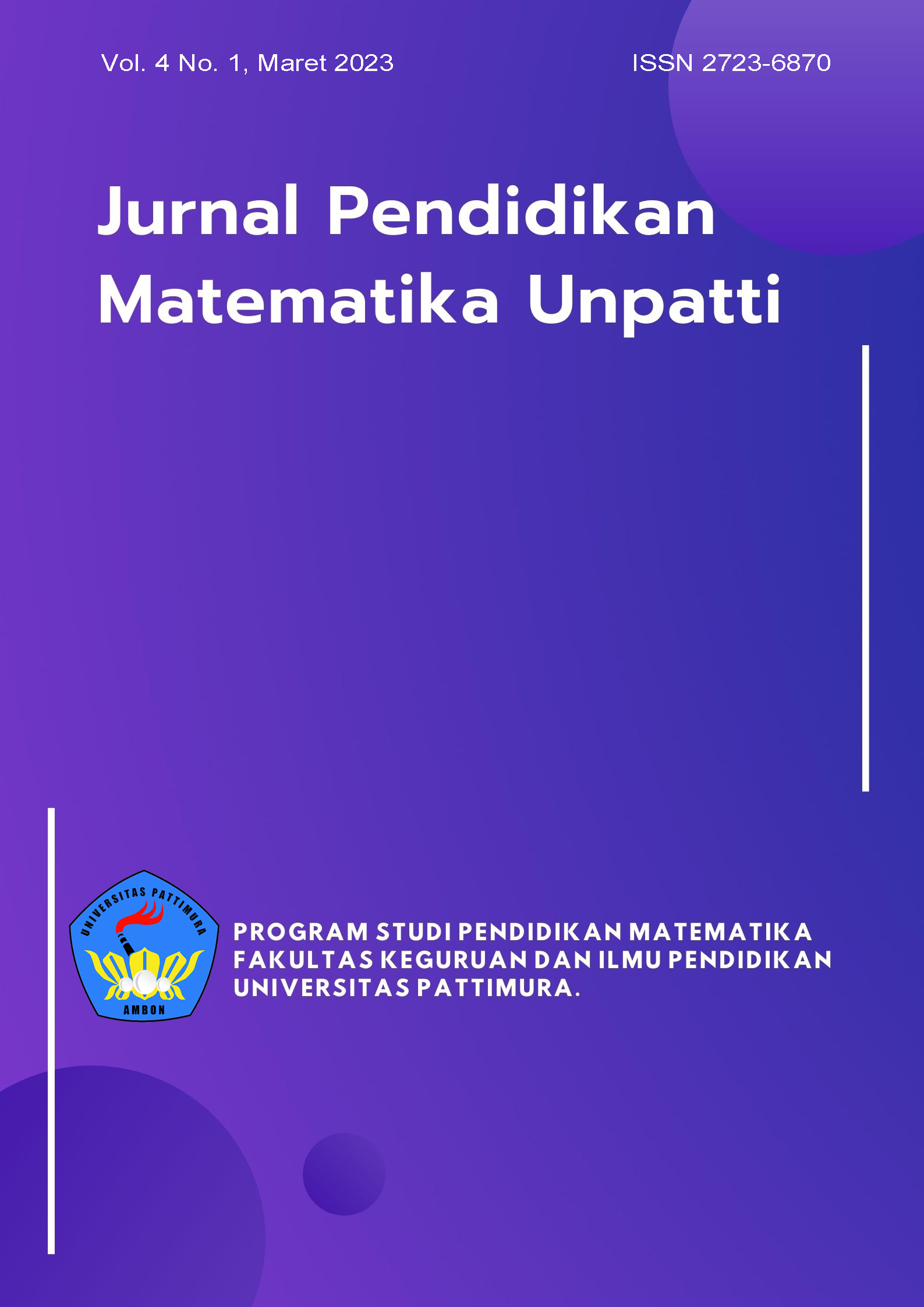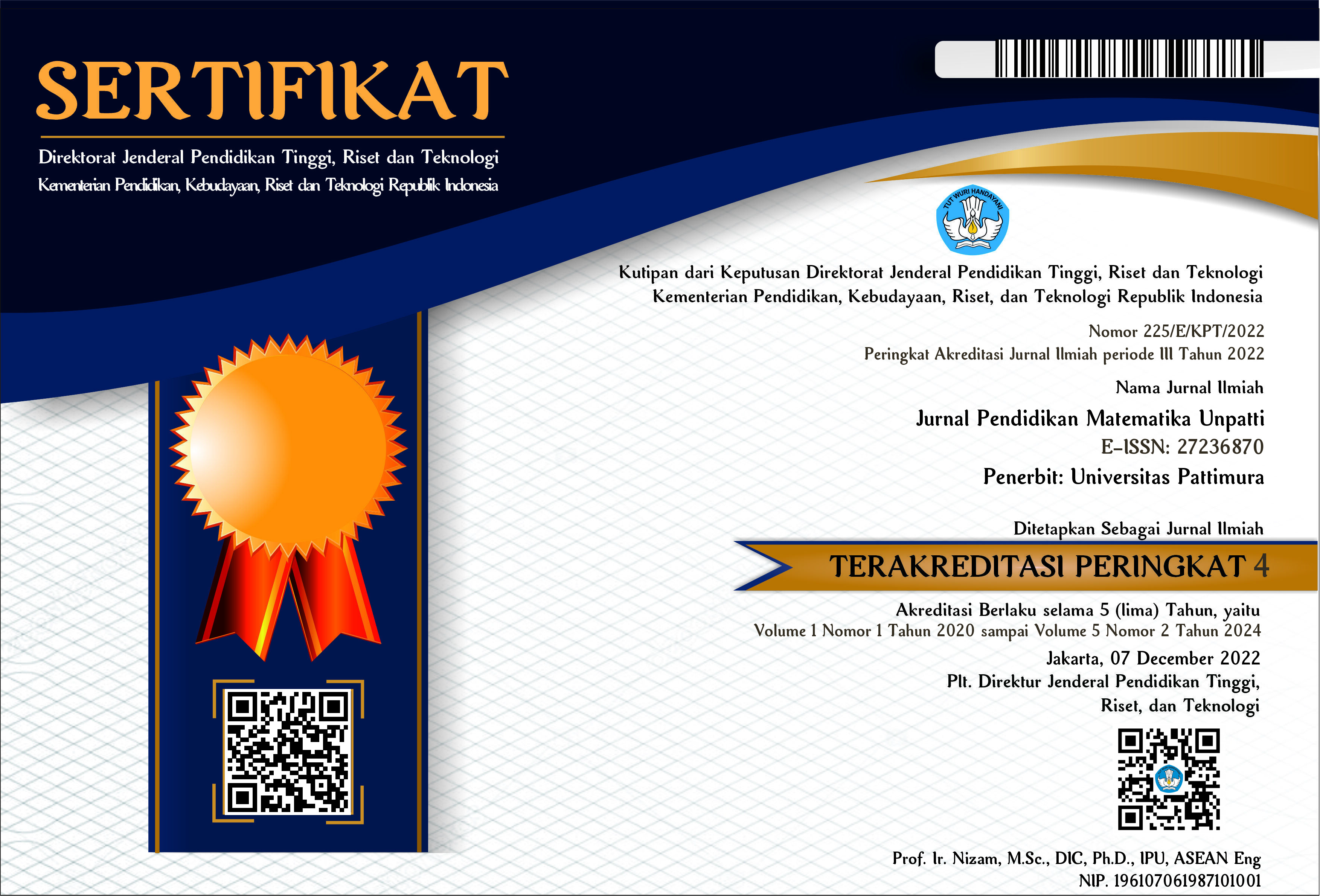PENINGKATAN KETERAMPILAN KOMUNIKASI MATEMATIS PESERTA DIDIK PADA PEMBELAJARAN MATEMATIKA REALISTIK
STUDI KEPULAUAN BERBASIS POTENSI PESISIR
Abstract
Communication skills are very important in learning to live in the 21st century, one of which is mathematical communication skills. Mathematical communication is one of the standard processes in learning mathematics. The purpose of this research is to analyze the mathematical communication skills after students receive realistic learning based on coastal potential. The research method was carried out using quasi-experimental research with pretest and posttest control groups. This research was conducted at three junior high schools in West Seram District with a sample of 120 student participants. The instrument developed was a matter of mathematical communication skills as much as 5 questions. Data analysis was carried out namely descriptive statistics, data requirements test including normality test and homogeneity test, then the hypothesis was tested with t-dependent and Wilcoxon tests. At this stage to obtain data on the results of tests of mathematical representation and communication abilities, scoring will be carried out on student's answers for each item. The findings show that there are differences in students' mathematical problem-solving and communication abilities taught by coastal and conventional RME-based learning. From the two learning models used it is proven that RME learning based on coastal potential is more influential and more effective than conventional learning on mathematical communication skills. There are differences in improving mathematical communication skills using the RME learning model based on coastal potential and conventional learning. Thus RME based on coastal potential is recommended for improving students' mathematical communication skills
Downloads
References
Ata Baran, A., & Kabael, T. (2021). An investigation of eighth grade students’ mathematical communication competency and affective characteristics. Journal of Educational Research, 114(4), 367–380. https://doi.org/10.1080/00220671.2021.1948382
Batlolona, F. A., Batlolona, J. R., Wairisal, P. L., & Leasa, M. (2018). Can the MM learning model improve results of students’ mathematical cognitive learning? Eurasia Journal of Mathematics, Science and Technology Education, 14(2), 609–616. https://doi.org/10.12973/ejmste/80625
Elmedina Nikoçeviq-Kurti. (2022). Effects of mindset, democratic parenting, teaching, and school environment on global citizenship of ninth-grade students. European Journal of Educational Research, 11(3), 1245–1257.
Ezrailson, C., Kamon, T., Loving, C. C., & McIntyre, P. M. (2006). Teaching through Interactive Engagement: Communication is Experience. School Science and Mathematics, 106(7), 278–279. https://doi.org/10.1111/j.1949 8594.2006.tb17918.x
Laurens, T., Batlolona, F. A., Batlolona, J. R., & Leasa, M. (2018). How does realistic mathematics education (RME) improve students’ mathematics cognitive achievement? Eurasia Journal of Mathematics, Science and Technology Education, 14(2), 569–578. https://doi.org/10.12973/ejmste/76959
Linhart, J. M. (2014). Teaching writing and communication in a mathematical modeling course. Primus, 24(7), 594–607. https://doi.org/10.1080/10511970.2014.895459
National Council of Teachers of Mathematics. (2000). Principles and standards for school mathematics. Reston, VA: National Council of Teachers of Mathematics.
Nuraina, N., & Mursalin, M. (2018). Improving students’ mathematical communication skills through learning start learning models with a question on pythagoras. Malikussaleh Journal of Mathematics Learning (MJML), 1(2), 44. https://doi.org/10.29103/mjml.v1i2.2231
Pourdavood, B. R. G., & Wachira, P. (2015). Importance of mathematical communication and discourse in secondary classrooms. Global Journal of Science Frontier Research: F Mathematics and Decision Sciences, 15(10), 1–13.
Rahman, R. A., Yusof, Y. M., Kashefi, H., & Baharun, S. (2012). Developing mathematical communication skills of engineering students. Procedia - Social and Behavioral Sciences, 46, 5541–5547. https://doi.org/10.1016/j.sbspro.2012.06.472
Rohid, N., Suryaman, S., & Rusmawati, R. D. (2019). Students’ mathematical communication skills (MCS) in solving mathematics problems: a case in indonesian context. Anatolian Journal of Education, 4(2), 19–30. https://doi.org/10.29333/aje.2019.423a
Sitorus, J., & Masrayati. (2016). Students’ creative thinking process stages: Implementation of realistic mathematics education. Thinking Skills and Creativity, 22, 111–120. https://doi.org/10.1016/j.tsc.2016.09.007
Sumirattana, S., Makanong, A., & Thipkong, S. (2017). Using realistic mathematics education and the DAPIC problem-solving process to enhance secondary school students’ mathematical literacy. Kasetsart Journal of Social Sciences, 38(3), 307–315. https://doi.org/10.1016/j.kjss.2016.06.001
TamirAhmed, H. (2021). Mathematical communication skills and their relationship to mathematics among third- stage intermediate students. Turkish Online Journal of Qualitative Inquiry (TOJQI), 12(7), 12341–12357.
Tong, D. H., Uyen, B. P., & Quoc, N. V. A. (2021). The improvement of 10th students’ mathematical communication skills through learning ellipse topics. Heliyon, 7(11), 1–12. https://doi.org/10.1016/j.heliyon.2021.e08282
Yaniawati, R. P., Indrawan, R., & Setiawan, G. (2019). Core model on improving mathematical communication and connection, analysis of students’ mathematical disposition. International Journal of Instruction, 12(4), 639–654. https://doi.org/10.29333/iji.2019.12441a
Copyright (c) 2023 Anderson Leonardo Palinussa, Darma Andreas Ngilawajan

This work is licensed under a Creative Commons Attribution 4.0 International License.
Jurnal Pendidikan Matematika Unpatti is an Open Access Journal. The authors who publish the manuscript in Jurnal Pendidikan Matematika Unpatti agree to the following terms:
Jurnal Pendidikan Matematika Unpatti is licensed under a Creative Commons Attribution 4.0 International . This permits anyone to copy, redistribute, remix, transmit and adapt the work provided the original work and source is appropriately cited.
This means:
(1) Under the CC-BY license, authors retain ownership of the copyright for their article, but authors grant others permission to use the content of publications in Jurnal Pendidikan Matematika Unpatti in whole or in part provided that the original work is properly cited. Users (redistributors) of Jurnal Pendidikan Matematika Unpatti are required to cite the original source, including the author's names, Jurnal Pendidikan Matematika Unpatti as the initial source of publication, year of publication, volume number, issue, and Digital Object Identifier (DOI); (2) Authors grant Jurnal Pendidikan Matematika Unpatti the right of first publication. Although authors remain the copyright owner.





